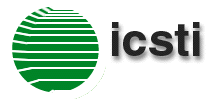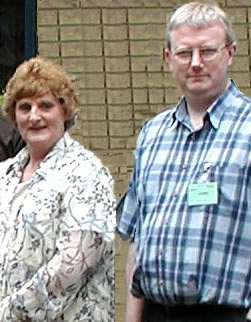
>Past
President's Column
>PEDECIBA
>Scientific and Technical Information
>Macromolecular
Nomenclature and Terminology
>Aligning
the Red and Blue Books
>IUPAC
News
>Awards
>IUPAC
Projects
>Highlights
from PAC
>Provisional
Recommendations
>New
Books
>Reports
from Conferences
>Conference
Announcements
>Conference
Calendar
Chemistry International
Vol. 24, No. 6
November 2002
Scientific and Technical Information
IUPAC Representative's Report on the 2002 ICSTI General Assembly
by Wendy Warr
Read also Cometh A Digital Dark Age? by Tony Davies
I have the pleasure to be IUPAC’s representative to ICSTI, the International Council for Scientific and Technical Information <www.icsti.org>. ICSTI is a forum for interaction between organizations that create, disseminate, and use scientific and technical information. It is unique in its breadth of membership– primary and secondary publishers, database producers, government departments, national libraries, and users from across the world–because it represents such a broad range of interests in a multiplicity of scientific disciplines.
The ICSTI General Assembly is hosted by a different member organization each year. Recent meetings have been held in South Africa, the United States, Scotland, Taiwan, and Germany. Next year’s meeting will be held in Canada. At this year’s meeting there was a representative from every major land mass except Antarctica.
The 2002 Assembly was hosted in June by KTHB, the library of the Royal Institute of Technology in Stockholm, Sweden, which had celebrated the opening of a splendid new building the month before. The assembly hosts arranged for tours of the new facility and a visit to the Viking site of Birka. The Council Dinner was held in Stockholm City Hall, emulating the December 2001 Nobel Laureates’ formal dinner. Such functions, which, in my opinion General Assembly hosts use legitimately and hospitably out of national pride, have led detractors to suggest that ICSTI is some sort of social club for those in the higher echelons of information organizations. This has certainly not been the case while IUPAC has been a member, although I have noticed a certain change in focus.
Some years ago, there was much discussion about the role of professional publishers and on copyright issues as publishers struggled to find new, money-making arrangements in the changing world of electronic publishing. Nowadays, there is much more discussion about "free" information and how to provide access to those in the Third World. Indeed, at the Stockholm ICSTI meeting, the Swedish International Development Agency invited observers from the National Information System for Science and Technology in New Delhi, India, and from the Sri Lanka Scientific and Technical Information Center. Access for all was also one of the main underlying themes at the second UNESCO/ICSU Conference on Electronic Publishing in Science, supported by ICSTI, and held in Paris in February 2001. A detailed report is available online. At the public conference in Stockholm, a representative of the Institute of Physics in Mexico also presented a paper on the "digital divide."
A one-day conference, open to the public, is held in conjunction with each ICSTI General Assembly. This year’s theme was "Scientific information: the challenges of creating and maintaining access." Papers of particular interest to me, personally, were presented by Uwe Assmann of Linköping University, on the second generation Web; by Ian Butterworth of Imperial College, London, on academic user behavior in accessing scholarly information; and by Mayur Amin of Elsevier Science, whose publisher viewpoint revealed some of the inconsistencies in user perceptions. The conference papers, or at least the presenters’ slides, will appear in a next issue of ICSTI’s journal Forum; see the Web site <www.icsti.org/forum>.
ICSTI also funds a number of projects under the auspices of its technical activities and information policy committees. One project worth mentioning here is Henry Kehiaian’s "IUCOSPED" numeric data standardization effort. This work was supported in a small way by IUPAC about two years ago, and that was instrumental in raising further financial support from the International Council for Science (ICSU) and ICSTI. A final report is to be presented to the CODATA (ICSU Committee on Data for Science and Technology) General Assembly in October 2002. A Data Explorer portal, built on an Oracle database, will reportedly be made available at FIZ Karlsruhe.
Tony DaviesICSTI is currently very interested in ensuring that digital data is permanently archived. ICSTI, ICSU, and CODATA sponsored a seminar in February 2002 to consider the challenges. Tony Davies, secretary of the IUPAC Committee on Printed and Electronic Publication (CPEP), has written a useful article about this. Other projects, amongst many, have involved classifications and glossaries, knowledge management, the EU Copyright Directive, and work with the Ingenta Institute on access to journals through subscriptions and document delivery. In January 2003, ICSTI will be involved with two meetings on the public domain and open access to scientific and technical information generated by public institutions.
ICSTI’s Secretariat is under new management and the organization’s officers (who serve on a voluntary basis) are actively ensuring that ICSTI’s meetings and projects meet the rapidly changing needs and interests of its 50 or more member organizations. IUPAC and the International Unions of Physics and Crystallography are three of the nine members in the international category. I conclude that IUPAC and ICSTI continue to receive mutual benefits from the networking within this global community.
Wendy Warr <[email protected]>, managing consultant at Wendy Warr & Associates in the United Kingdom, chairs the IUPAC Committee on Printed and Electronic Publications.
www.iupac.org/standing/on/icsti
![]()
News
and Notices - Organizations and People
- Standing Committees
Divisions
- Projects - Reports
- Publications - Symposia
- AMP - Links
Page last modified 31 October 2002.
Copyright © 1997-2002 International Union of Pure and Applied Chemistry.
Questions or comments about IUPAC, please
contact the Secretariat.
Questions regarding the website, please contact [email protected]

